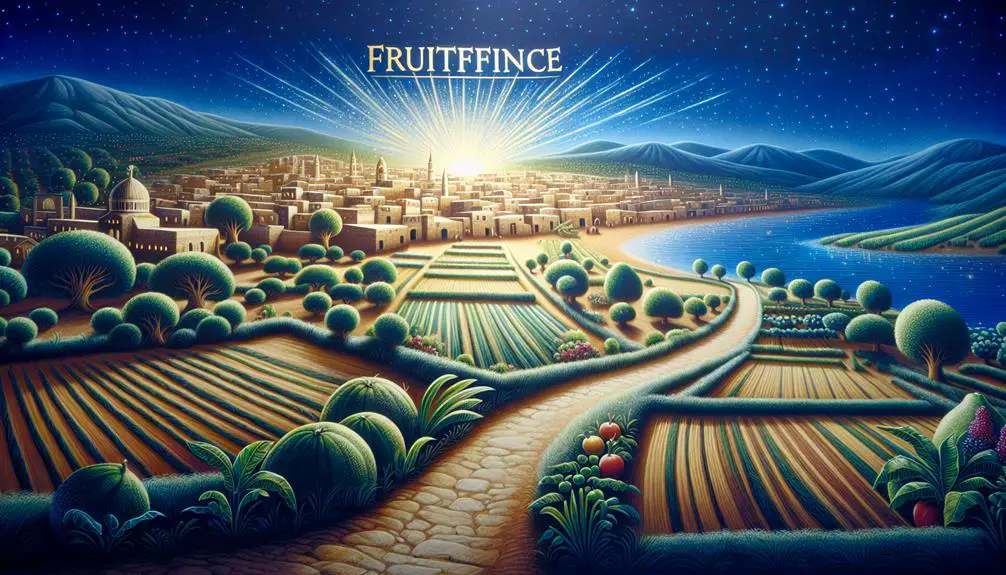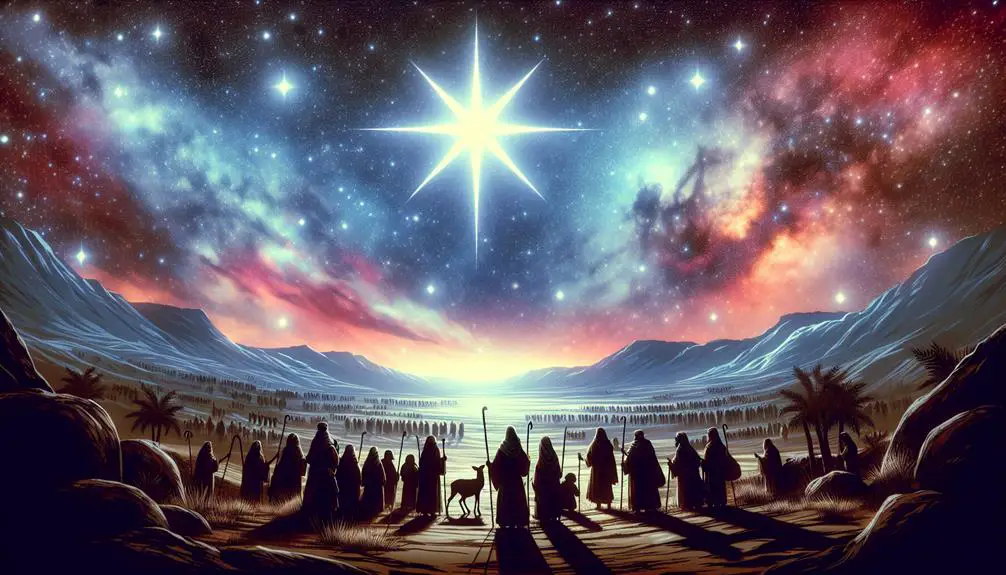Journey through Ephrathah's biblical significance, where ancient mysteries and prophecies unveil a story far beyond its geographical bounds.

Ephrathah in the Bible
In the tapestry of biblical narratives, Ephrathah is a thread that weaves through moments of profound significance, hinting at its deeper importance. You might know it as Bethlehem, but there's much more to Ephrathah than its famous association with the birthplace of Jesus.
From its enigmatic mention in Genesis to its pivotal role in the prophecy of Micah, Ephrathah serves as a backdrop for episodes that have shaped the Judeo-Christian tradition. Yet, its full meaning remains elusive, shrouded in the mists of history and theology.
As you explore this ancient name, you'll uncover layers of meaning that might change how you view its place in the biblical narrative.
Key Takeaways
- Ephrathah symbolizes divine favor and the fulfillment of biblical prophecies, notably the birthplace of Jesus.
- It is historically intertwined with King David's lineage, emphasizing its significance in Israel's spiritual and royal heritage.
- Bethlehem Ephrathah's connection to agriculture highlights its role in sustaining the community and its bountiful harvests.
- The site of Rachel's Tomb near Ephrathah adds archaeological and spiritual depth, enriching its historical and cultural importance.
The Meaning of Ephrathah

In exploring the meaning of Ephrathah, it's essential to understand that this term holds significant historical and biblical importance, representing not just a geographical location but also conveying deeper symbolic nuances within the scriptural context. The geographical significance of Ephrathah can't be overstated. Historically, it refers to a region that's closely associated with Bethlehem in Judea, a place deeply embedded in the cultural and spiritual heritage of the Jewish people. This connection isn't merely about physical proximity; it's a reflection of Ephrathah's role in the narrative of the people of Israel, serving as a backdrop for pivotal events and stories that have shaped their identity and beliefs.
The cultural implications of Ephrathah extend beyond its historical roots. In the biblical narrative, Ephrathah is often mentioned in contexts that highlight its symbolic importance. It's portrayed as a place of origin, fertility, and blessing, embodying the ideals and aspirations of the people connected to it. This symbolism is woven into the fabric of biblical literature, where Ephrathah represents not just a physical space but a spiritual concept, echoing themes of hope, renewal, and divine promise.
Understanding Ephrathah requires one to appreciate its dual role as both a tangible location and a metaphorical space. It's a testament to how geography and culture intertwine in the biblical worldview, where places aren't just settings for historical events but also carriers of meaning, embodying the values and narratives of the people who hold them dear.
Ephrathah in Genesis

Why does Ephrathah hold such a pivotal role in the Genesis narrative, and what insights can you gain from its mentions in this foundational biblical book? Ephrathah's appearances in Genesis aren't merely geographical markers but are deeply interwoven with themes of lineage, inheritance, and divine promise. The narrative's complexity is enriched through its association with these concepts, providing a multifaceted understanding of its significance.
- Caleb's Inheritance: Ephrathah is linked to Caleb's inheritance, symbolizing a divine endowment and the fulfillment of promises. This connection underscores the importance of faithfulness and the rewards of devotion in the biblical text. The land's allocation to Caleb and his descendants marks Ephrathah as a place of significance, highlighting its role within the broader narrative of divine covenant and lineage.
- Fertility Symbolism: The name Ephrathah itself carries connotations of fertility, a symbolism that's crucial to understanding its significance in Genesis. This attribute of fertility not only pertains to the land's physical productivity but also to the generative capacity of Abraham's lineage, through which the promised multitude of nations would emerge.
- Cultural Significance: The mention of Ephrathah in Genesis ties it to foundational stories of identity and belonging. It serves as a backdrop to pivotal events that shape the collective memory and identity of the Israelites.
- Theological Implications: Ephrathah's inclusion in Genesis invites readers to ponder the relationship between divine promise, land, and lineage. It prompts an exploration of how physical spaces are imbued with spiritual significance, shaping the narrative's theological contours.
Ephrathah's role in Genesis thus extends beyond a mere geographical mention, embodying themes of promise, fertility, and divine favor. Its analysis offers profound insights into the biblical understanding of land, inheritance, and divine purpose.
Bethlehem and Ephrathah

Exploring the biblical narrative further, we find Bethlehem and Ephrathah intricately linked, offering deeper insights into their historical and prophetic significance. You'll see that ancient texts often refer to Bethlehem as Bethlehem Ephrathah, highlighting its roots in both physical and spiritual heritage. This connection isn't just a matter of geographic coincidence but speaks volumes about the cultural and agricultural backdrop of ancient Israel.
Bethlehem, often revered for its mention in the Nativity story, was more than a mere backdrop for biblical events. It was a hub of ancient agriculture, thriving on the fertile lands of Ephrathah. This area was known for its bountiful harvests, which were essential for the sustenance and economy of the region. The intertwining of Bethlehem and Ephrathah reflects a community deeply connected to the land, embodying the essence of survival and prosperity in ancient times.
Modern interpretations of these biblical locales often overlook the significance of their agricultural heritage. However, understanding this aspect can provide a richer, more nuanced appreciation of the biblical narrative and the lessons it holds for contemporary readers.
Here's a quick overview to enhance your understanding:
Aspect |
Bethlehem |
Ephrathah |
|---|---|---|
Meaning |
House of Bread |
Fruitfulness |
Significance |
Nativity Site |
Agricultural Hub |
Cultural Impact |
Spiritual Heritage |
Economic Foundation |
Modern Interpretation |
Historic Pilgrimage Site |
Symbol of Prosperity |
This table encapsulates the multifaceted relationship between Bethlehem and Ephrathah, highlighting their roles in ancient agriculture and the enduring legacy that informs modern interpretations of these biblical sites.
The Prophecy of Micah

The prophecy of Micah, an ancient text steeped in profound implications, offers a vivid foresight into the birth of Jesus Christ in Bethlehem Ephrathah, underscoring its spiritual and historical significance. This prophecy, nestled within the broader narrative of the Hebrew scriptures, stands as a testament to the forethought and precision with which divine messages were imparted to and through Micah's contemporaries.
Micah, a prophet in the 8th century BCE, articulated visions that transcended his immediate reality, anchoring the future hope of nations in the small, seemingly insignificant town of Bethlehem Ephrathah. His words, echoing through centuries, emphasized the prophetic significance of this locale as the birthplace of a ruler whose origins are from of old, from ancient times.
When you delve into the prophecy of Micah, specifically Micah 5:2, you encounter several key dimensions that underscore its importance:
- Prophetic Precision: The specific mention of Bethlehem Ephrathah, distinguishing it from other Bethlehems, showcases Micah's prophetic accuracy.
- Spiritual Fulfillment: The prophecy is revered for its fulfillment in the New Testament, marking a pivotal moment in Christian theology.
- Historical Context: Micah's era was marked by social upheaval and spiritual searching, making his clear, hopeful message particularly resonant.
- Universal Significance: Beyond its initial audience, the prophecy speaks to a broader theme of divine intervention and guidance across ages.
Through these aspects, you grasp the intricate layers of meaning embedded in Micah's prophecy, appreciating its enduring relevance and the profound insight it offers into the dynamics of divine promise and fulfillment.
Ephrathah and King David

Delving into the historical and biblical narratives, it's evident that Ephrathah's significance extends beyond the prophecy of Micah, serving as the backdrop for pivotal moments in the life of King David. This locale isn't merely a geographical point on a map but is deeply intertwined with David's lineage, heralding the origins of a king whose legacy would forever alter the course of Israelite history.
Ephrathah, often synonymous with Bethlehem, plays a crucial role in understanding David's early life and his ascension to kingship. You'll find that it's not just the birthplace of David but also a symbol of his humble beginnings, from a shepherd boy to the anointed king of Israel. The threads of his lineage, deeply rooted in Ephrathah, underscore the fulfilment of divine promises, weaving a narrative that spans generations.
Furthermore, Ephrathah's connection to David isn't confined to his birth and anointing. It also becomes a critical element in the dynamic between David and Saul. Saul's jealousy towards David, fueled by the latter's rising popularity and divine favor, finds a poignant echo in the history of Ephrathah. It's here, in the context of David's lineage and his ties to this land, that Saul's animosity finds a deeper narrative significance. David's eventual triumph and consolidation of his kingdom, underscored by his Ephrathah heritage, reflect not only on his personal destiny but also on the broader themes of divine providence and the fulfillment of prophecy within the biblical narrative.
In essence, Ephrathah is more than a setting—it's a testament to the enduring legacy of King David, woven into the very fabric of Israel's history.
Rachel's Tomb Near Ephrathah

Shifting our focus to another significant landmark near Ephrathah, we encounter Rachel's Tomb, a site that intertwines deeply with the fabric of biblical history and heritage. This revered location not only marks the final resting place of Rachel, a matriarch in the biblical narrative, but also serves as a testament to the ancient and ongoing cultural practices that have surrounded this sacred spot.
Delving into the historical and archaeological aspects of Rachel's Tomb, you'll find that:
- Archaeological findings have provided insight into the tomb's structure and the various periods of construction and renovation it has undergone. These discoveries shed light on the tomb's significance through different eras, reflecting its enduring importance in the religious and cultural landscape.
- The site has been a focal point for pilgrimage and veneration for centuries, attracting visitors from diverse backgrounds. This practice underscores the tomb's role in fostering a sense of continuity and connection among generations.
- Cultural practices linked to Rachel's Tomb, such as prayer and commemoration activities, illustrate the deep spiritual and emotional bond that people have with this location. These practices are rooted in traditions that date back millennia and continue to evolve.
- The landscape around Rachel's Tomb, including its proximity to Ephrathah, has been influenced by various historical and geopolitical developments. These factors have shaped the access, appearance, and significance of the site over time.
Analyzing Rachel's Tomb in the context of Ephrathah offers a profound understanding of the intertwining of geography, history, and spirituality that characterizes this region.
Ephrathah in Christian Tradition

Exploring Ephrathah's significance in Christian tradition reveals its deep connections to pivotal biblical prophecies and narratives. You'll find that Ephrathah isn't just a name dropped in the Old Testament; it's a cornerstone in understanding the fulfillment of prophecy through the birth of Jesus Christ, deeply woven into Christmas traditions and worship practices around the world.
Aspect of Christian Tradition |
Connection with Ephrathah |
|---|---|
Christmas Traditions |
Ephrathah, being the prophesied birthplace of Jesus (Micah 5:2), enriches Christmas narratives, emphasizing God's promises and their fulfillment. |
Worship Practices |
Songs and sermons during Advent frequently reference Bethlehem Ephrathah, highlighting its role in salvation history. |
Nativity Scenes |
Often depicted with attention to historical and scriptural accuracy, they serve as a visual reminder of Jesus' humble beginnings in Bethlehem, once known as Ephrathah. |
Scriptural Study |
Ephrathah's mention in the Bible sparks deeper engagement with prophecies concerning the Messiah, enriching personal and communal faith journeys. |
You'll see that Ephrathah's role transcends mere geographical significance; it serves as a testament to God's faithfulness across generations. Christmas traditions, from the lighting of Advent candles to the singing of ancient carols, echo the prophetic importance of Ephrathah. Worship practices, whether through the solemn reading of Micah's prophecy or the joyful reenactment of the nativity, invite believers to reflect on the profound mystery of the Incarnation. In this way, Ephrathah's biblical roots enrich Christian worship and belief, offering layers of meaning to explore during the season of Advent and beyond.
Frequently Asked Questions
How Did the Name Ephrathah Evolve Linguistically Over Time, and Are There Any Ancient Inscriptions or Texts Outside the Bible That Mention Ephrathah?
You're delving into how 'Ephrathah' morphed linguistically over time, employing linguistic methodology and ancient phonetics. There's evidence in non-Biblical ancient texts and inscriptions that mention Ephrathah, showcasing its evolution.
By analyzing these artifacts, you're uncovering how shifts in sounds and writing practices over centuries have influenced its spelling and pronunciation.
This detailed, authoritative analysis reveals the fluid nature of language and how historical contexts shape words.
Are There Any Archaeological Findings or Historical Sites Associated Specifically With the Biblical Location of Ephrathah That Have Been Discovered in Modern Times?
You're seeking archaeological treasures tied to a place known as Ephrathah, but without delving into its biblical roots.
In modern times, while Ephrathah festivals celebrate a rich past, direct archaeological evidence linking back to the historical Ephrathah remains elusive. Despite extensive searches, no specific sites have been definitively attributed to Ephrathah.
This gap in physical evidence challenges historians and archaeologists as they attempt to piece together the puzzle of Modern Ephrathah's ancient origins.
How Has the Interpretation of Ephrathah's Significance Changed Among Different Jewish and Christian Denominations Throughout History?
You've noticed that modern interpretations of Ephrathah's significance have evolved through interfaith dialogues among Jewish and Christian denominations. Historically, these discussions have deepened understanding, highlighting diverse theological perspectives.
As comparative analysis of religious texts and traditions became more prevalent, interpretations shifted, reflecting broader theological and cultural contexts. This evolution underscores the dynamic nature of religious interpretation, where historical, archaeological, and literary analyses contribute to a richer, more nuanced view.
Can the Geographical Boundaries of Ephrathah Be Accurately Determined Based on Historical and Biblical References, and How Do These Compare With Present-Day Maps?
Imagine you're tracing the ancestry of a vintage wine. Just as climate influence shapes its character, so does it guide the boundaries of ancient lands.
Determining the exact lines of Ephrathah from historical and biblical references is akin to mapping vineyards with shifting sands. Modern settlements and archaeological finds offer clues, but comparing them to present-day maps reveals a complex overlay, where past and present intertwine, offering a detailed yet ever-evolving picture.
What Role Does Ephrathah Play in Religious Rituals or Traditions Today, if Any, Outside of Its Biblical Context and References?
Today, you might find that Ephrathah's influence extends beyond its biblical roots into cultural festivals and modern symbolism. It's woven into rituals that celebrate heritage and tradition, offering a blend of historical reverence and contemporary relevance.
This place's legacy enriches various ceremonies, where its story is remembered and honored, albeit in a form that's adapted to fit the current era's understanding and values. It's a testament to its enduring significance.
Conclusion
In analyzing Ephrathah's biblical significance, it's evident that its mention not only illuminates historical and theological contexts but also underscores profound narratives.
A striking statistic is that despite its few mentions, Ephrathah's pivotal role in prophecies, notably Micah 5:2, has influenced countless interpretations across millennia. This reveals the power of biblical geography in shaping faith narratives.
Ephrathah's enduring legacy, from its association with King David to its role in Christian tradition, highlights its intricate tapestry within sacred texts.



Sign up